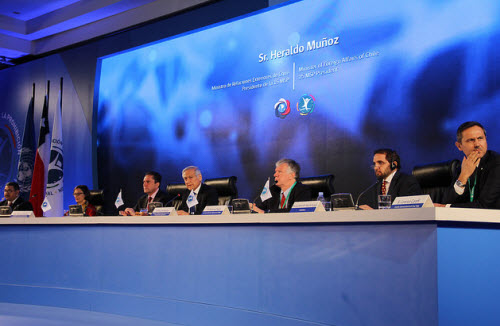|
29.11.2016
Santiago de Chile – The Minister of Foreign Affairs of Chile, H.E. Heraldo Muñoz was joined today by H.R.H. Prince Mired of Jordan, and other high-level representatives in the opening of the Fifteenth Meeting of the States Parties to the Anti-Personnel Mine Ban Convention, also known as the Ottawa Convention. More than 400 delegates representing over 80 nations are meeting in Santiago from 28 November to 1 December, seeking to measure progress in mine clearance, stockpile destruction and victim assistance while taking stock of challenges that remain in implementing the Convention. Delegates were greeted, via video, by H.E. Michele Bachelet, President of Chile, who praised this Convention as a leading humanitarian disarmament treaty, pioneer in its cooperation between civil society and governments; one whose main aim is human security. “Chile is fully committed to implementing the Ottawa Convention,” the President said. “We take our obligations under the Convention seriously, responsibly and efficiently, providing assistance to the victims, and offering cooperation and assistance within our means,” she added. Special envoy of the Convention, H.R.H. Prince Mired of Jordan provided a message on behalf of King Abdullah II. “I would like to unreservedly congratulate the Chilean Mine Action Program for successfully embracing the concept of ‘National Ownership’ in all of its approach to mine action. Bravo to you all for the work that is being done in Chile! It is of course at the end of the day all about saving lives and protecting the environment for future generations,” said Prince Mired. The Prince also called the States Parties to remain engaged, “it is our collective responsibility to make sure that the Convention stays healthy and vibrant, to keep donors interested and engaged until we reach a point when the Convention’s goals have truly been fulfilled.” Civil society partners including the 1997 Peace Nobel Laureate and the International Campaign to Ban Landmines and the International Committee of the Red Cross, also participated in the opening, calling the Convention a successful treaty and encouraging States Parties to remain committed to eliminating landmines and assisting the victims. “For further evidence of the effectiveness of the Convention, one needs to look no further than Latin America,” said Lorenzo Caraffi, Director of the ICRC South Cone division. “In the 1990’s the list of countries affected by anti-personnel mines in this region included Costa Rica, Chile, Colombia, Ecuador, El Salvador, Guatemala, Honduras, Nicaragua and Peru. Today, most of these have cleared their contaminated lands and efforts are well underway to […] becoming a region free from the threat of anti-personnel mines. Chile, which became a State Party in 2001, completed its stockpile destruction in 2003 having destroyed more than 299,219 landmines. Chile’s original mine clearance deadline has been extended to 1 March 2020. Coronel Rodrigo Ventura Sancho, director of the Chilean National Demining Comission, CNAD, said Chile’s work toward meeting its Convention obligation is steady. “Chile is effectively carrying out its demining operations to meet its 2020 deadline,” he said. “We have personnel working in the north part of the country, specifically in the Arica and Perinacota ,Tarapaca, and Antofagasta regions, and in the south, in the Magallanes and Antártica Chilena regions. The work is being carried out by armed forces represented by the army and the navy. To date, Chile has achieved clearance of 75% of its national work. That is, from 194 originally mined areas, Chile has cleared 146 up to date. And from 181,814 landmines planted around the borders in the 70s, 146,460, have been destroyed. All under the strictest safety standards,” the Coronel said. The first day also saw a special high panel on a demining initiative in Colombia which seeks to assist Colombia in meeting its landmine clearance. Norway, one of the largest funders in mine action, with United States have pledged over 50 million USD to this campaign. Chile and other countries have also contributed to this effect. In the afternoon, Peru and Niger requested additional time to meet their mine clearance obligations under the Convention. Peru resented a request for an extended mine clearance deadline until 2024. According to Col (ret.) Mario Espinoza, Technical Secretary from the Peru’s Mine Action Centre (CONTRAMINAS), previously unknown contamination to address will require additional time. The 128 newly-discovered areas are in the Cordillera del Condor, in the Ecuador-Peru region – a remote, thick forest, difficult to access and with rugged terrain. “Peru is still very committed to mine clearance and to meeting its Convention obligations. In this same spirit, cooperation and assistance to Peru, from international donors would help Peru meet its obligation faster”. Peru is looking to clear around 6,500 landmines in 430,000 square metres. Since Peru’s first request for an extension of its mine clearance deadline, it cleared in excess of 22,000 mines around its territory. Niger has also requested until 2020 to complete its mine clearance obligation. The Conference will answer to both these requests on Thursday 1 December in the afternoon. For more information contact the Convention's Implementation Support Unit (ISU) at: isu(at)apminebanconvention.org or call +41 22 730 9311.
|


